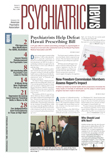Meeting patients' health and social functioning needs fosters their ability to survive and prosper, but among personality disorder patients those needs often remain unmet, according to a study published in the April Psychiatric Services. The study found that personality disorders were independently associated with a greater level of unmet need among psychiatric inpatients.
The study thus highlighted the importance of a comprehensive assessment of the needs of patients with personality disorders.
“The main take-home message for psychiatrists is that they should ideally be performing detailed assessments of need on their personality-disordered patients,” Paul Anthony Moran, M.D., a co-author of the study, told Psychiatric News. “In addition to the areas of need that we anticipated finding (particularly the need to address risk to self and others), we identified that personality disorder patients had significant unmet needs in the areas of poor self care, poor budgeting skills, and difficulties around sexual expression.”
In this study the presence of personality disorder was robustly and independently associated with the mean number of unmet needs. The association was highly significant, and in a linear regression model, the severity of personality disorder was the strongest predictor of a patient's having unmet needs.
Domains of need associated with the presence of a personality disorder resulted in problems with self care, psychotic symptoms, psychological distress, risk to self, risk to others, alcohol use, sexual expression, and budgeting.
The measurement of needs, which the study defines as including “broad domains of health and social functioning, which are necessary to survive and prosper in the community,” has become increasingly important to psychiatrists and mental health professionals, he said.
Patients with personality disorders have long placed a high demand on health and social services, according to the authors, and one possible reason is that they have a markedly higher number of unmet needs. No study has previously examined this question, he said.
The study used a combination of patient interviews and surveys and patient-record assessments of 153 psychiatric inpatients, including 83 who met all DSM criteria for any type of personality disorder.
Moran cautioned that it is not known if the findings are applicable to outpatient populations because that research has not yet been done.
“We clearly need more research into this area,” he said.
The findings suggest that future epidemiological studies of personality disorder should incorporate measures of need, the authors said. It remains to be seen whether the findings among an inpatient population will generalize to those cared for in community settings.
They pointed out that the association between personality disorder and greater risk to self and others means that assessments of personality disorder provide important information for the management of risk. Previous studies have identified personality disorders as predictive of future violence and suicidal behavior in samples of “mentally disordered persons,” the researchers pointed out.
Previous psychiatric surveys of patient needs have focused on psychotic patients and have not examined the service needs of patients with personality disorders.
The findings are consistent with other recent study results, the authors noted, that report that the diagnostic status of patients with personality disorders may change significantly over time, but functional status improves less significantly.
“Such findings add weight to the argument that the needs of personality-disordered patients should be assessed early in the treatment process, as was the case in this study,” the researchers said.
They conducted the assessment of personality after the assessment of need in order to reduce the possibility that their knowledge of personality status would bias the assessment of needs. They cautioned that it is possible that knowledge of needs status biased their assessment of personality.
Other research has shown that psychiatrists and mental health professionals may give different accounts of need than “service users” do, so the researchers suggested future research in this area should aim to incorporate both staff and user perspectives of need.
